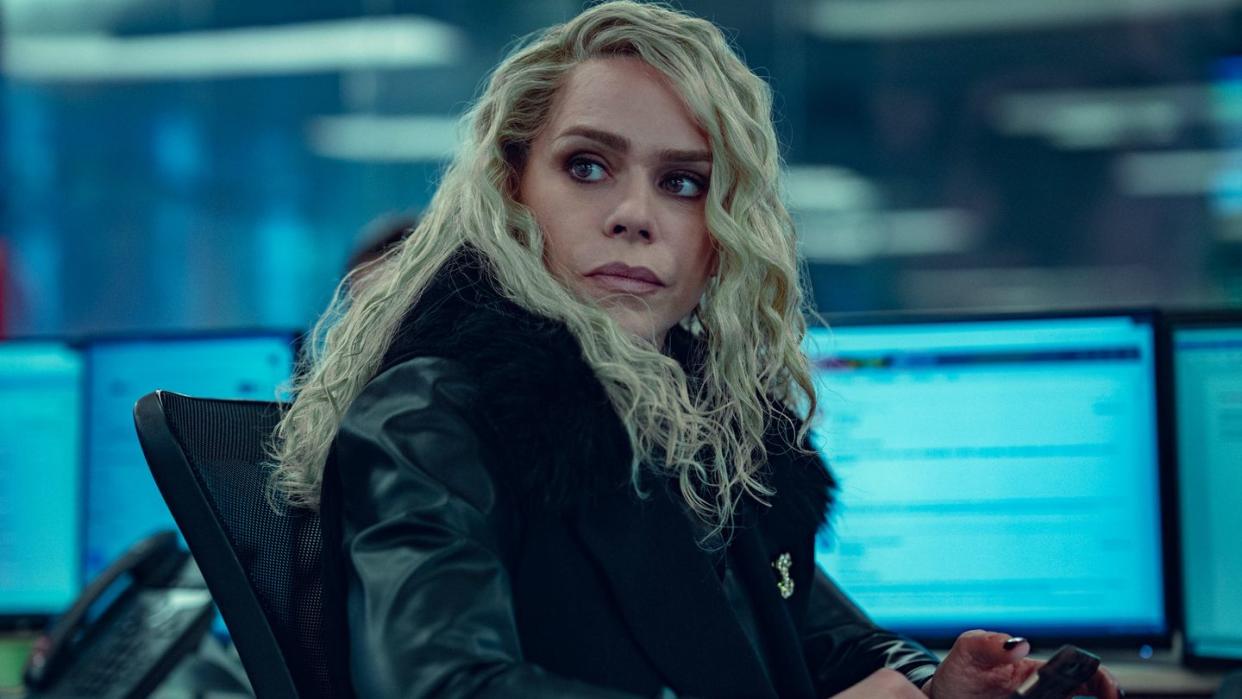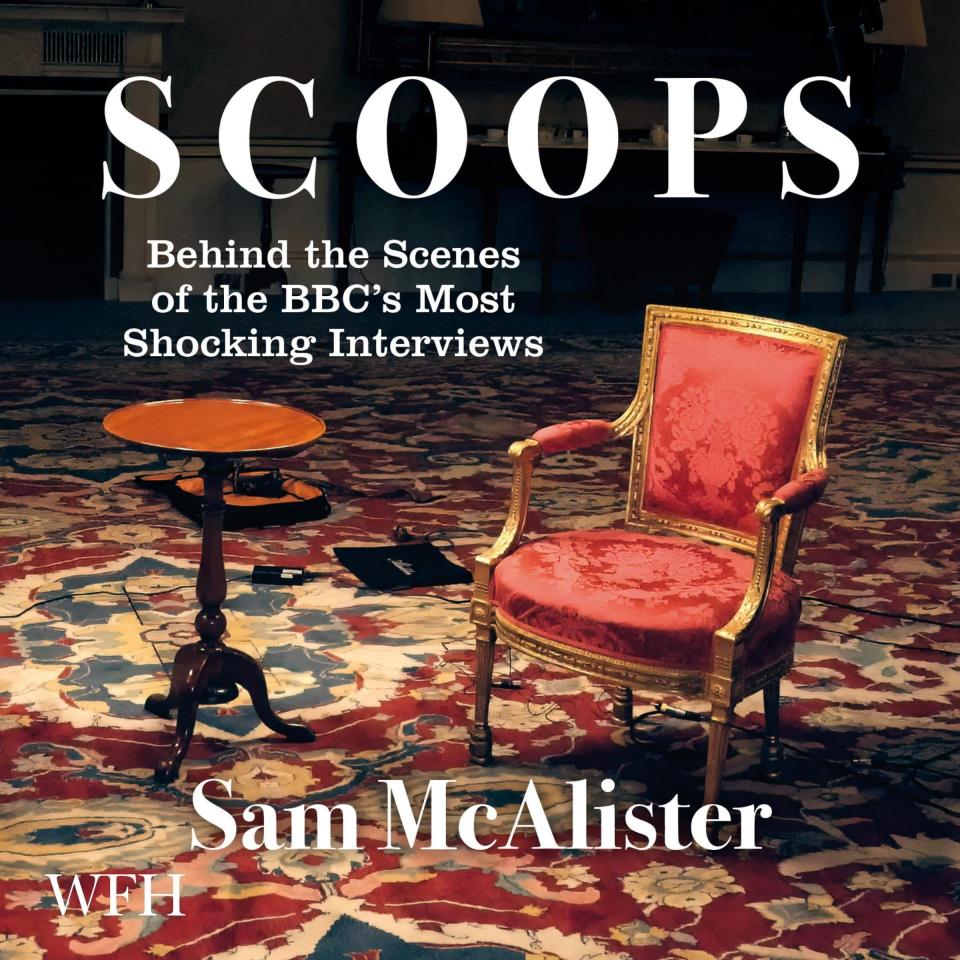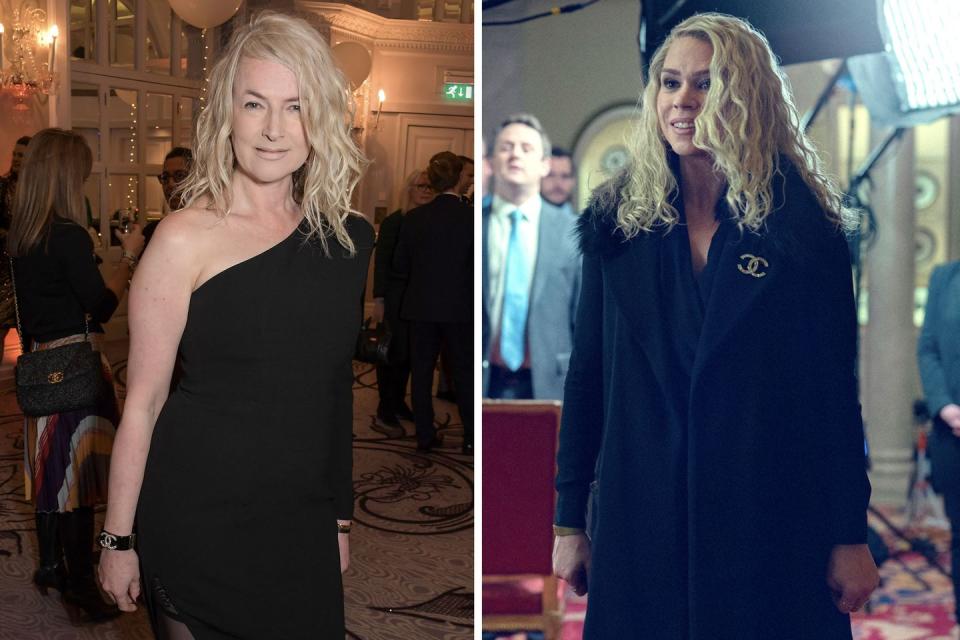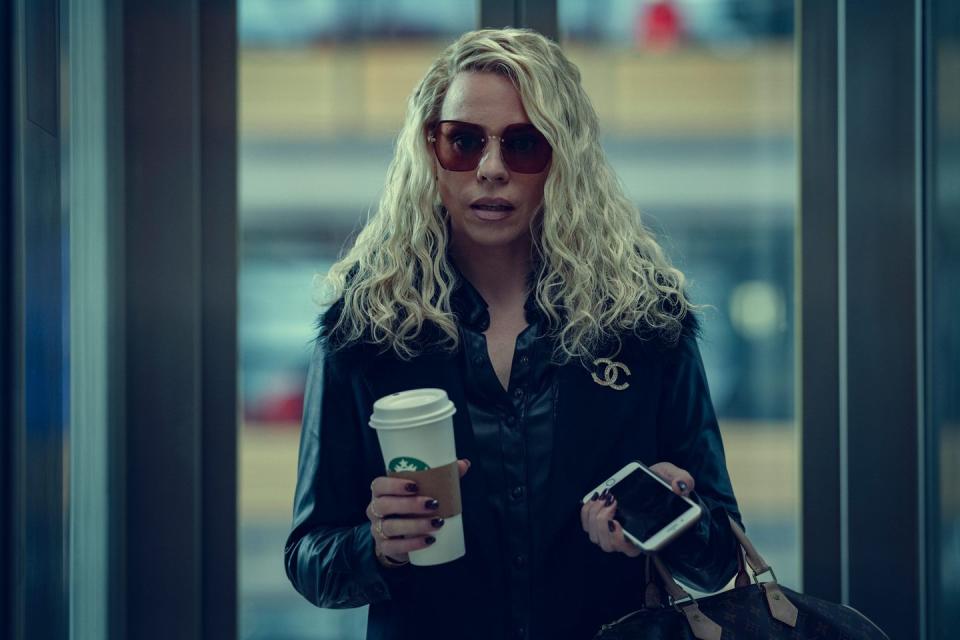Sam McAlister Cried When She Saw Billie Piper’s Performance in 'Scoop'

- Oops!Something went wrong.Please try again later.
"Hearst Magazines and Yahoo may earn commission or revenue on some items through these links."
Netflix’s new film Scoop meticulously recreates Prince Andrew’s 2019 Newsnight interview, with Rufus Sewell offering a spot-on depiction of the disgraced royal. But the streaming giant’s ability and determination to offer a true-to-life dramatization of the now-infamous TV program was only one part of why producer Sam McAlister was eager to work with them on adapting her story, and her book—Scoops: Behind the Scenes of the BBC's Most Shocking Interviews—for the small screen.

Scoops: Behind the Scenes of the BBC's Most Shocking Interviews
amazon.com
$14.31
“One of the reasons I was so compelled to work with Netflix and with Peter and with the production companies working on this was that they understood that the interview is 5% of the story. The other 95% is obviously the journalism,” she told Town & Country before the movie premiered. “In this case, it happens to be women journalists—so an extraordinary tale of hard work, resilience,women in journalism, and I hope a really positive reminder of, when it goes right, the power that journalism has. It’s an homage in a sense to those individuals who are still with us, but to the wider question of why journalism matters.”
Here, she opens up about the adaptation process, Prince Andrew’s “royal delusion” and her reaction to the news that Billie Piper would play her in the film.
What has it been like adapting your story for the screen?
Oh, it's been the most incredible experience. If you imagined what you would want in a miraculous situation where you have written your first book and Netflix option your book, and you have an extraordinary screenwriter like Peter Moffat, who you spend months and months with, who puts together the story of your life—if you had a magic wand, you couldn't have a more wonderful and supportive and creatively exciting experience than the one I've had with this particular film.
What details were essential to get right on screen?
Basically, when I was working on this screenplay and Peter and everyone on this project took such great care because there is of course, an extra obligation here because we're all alive and it's people I used to work with and care about. There is that extra, if you like, duty of care that I was really concerned about.
So when we had conversations about the screenplay, I would do three columns. So the first column would be all the things that kind of concern me a little bit, which I immediately discarded as being too trivial. And then in the middle I would put things that concerned me somewhat. And then in the final column, which was very rare, things that really, really concern me, and they would be things that we would then have a conversation about. But most crucially, I would say the one that I really would die in a ditch for was making sure that I was always shown with a gin martini rather than a glass of wine.
What did you make of Billie Piper’s performance?
Well, I am not embarrassed to say I cried when I first saw it. There is something so amazing about the way that she's able to capture my essence. What I thought was so brilliant about Billie's performance is I feel she really encapsulates who I am in terms of my energy, my passion, my verve and commitment to my work, my walk, my clothing, those superficial elements. But what she also encapsulated, which is the part that moved me, is the true meaning of what I was doing, which was my son, my mother, my sense of what really matters pretentiously in terms of accountability and truth. So I think she married those two parts of me, the serious and the unserious brilliantly.
I think it’s not uncommon to think, "Oh, if my life were a movie, who would play me?" and you actually got to have that experience. What was your initial reaction to the casting news?
Well, I don't know if you heard a scream where you were, but when I heard she was playing me, the scream was pretty loud. I'm the executive producer on Scoop. So of course I'm not writing the screenplay; I'm not directing it; I'm not doing the performances. But as far as there was capacity, I was asked about these things, and Billie was my number one choice. So when she said yes, I really was shriekingly over the moon.

I was familiar with the interview; we covered it at Town & Country back in 2019, but something I was really struck by watching the film was that Prince Andrew thought the interview went well. Why do you think he thought that?
Prince Andrew is in a really invidious position because effectively what he's been told all his life is that he's amazing, he's brilliant. He's never had to pay for anything. He's never had a job interview. He's never had a 360—you know, he's not been knocked back in life. So he has an extraordinary capacity for misunderstanding his own capabilities. I call it 'royal delusion,' but it's something you see in major companies with CEOs, with bosses. It's not just Prince Andrew, but his was the most extreme example because to get to the end of that interview and think it had gone well, not only did he think it had gone well from the beam on his face, he clearly thought it had gone brilliantly. He offered a tour of the Palace, which Emily went on, and those iconic pictures that were captured by Mark Harrison, the photographer on the day, and we recreated in the film, were taken after that interview happened. So you can zoom in on his face and see how delighted he looks and zoom in on Emily's face and see how concerned she looks. So he genuinely seemed thrilled by his performance, and I have no idea how long his perception of having done well lasted, but it can't have been for too many days."
What was your first impression when you met him?
He was exactly as I imagined because of course, I had researched him before going to do all of the negotiations. He was very friendly, very open, excruciatingly open as you see in the interview. And also he has the energy of a very enthusiastic puppy or something. He's a man who's very confident in himself and full of energy. So that was my expectation of him and that's what I received.
What I didn't expect was the disarming way that he was receptive to my bluntness. I mean, you see a couple of scenes in the movie that are true, where of course I mentioned to him about being known as “Randy Andy.” You can't imagine many members of the royal family where you say that to them and their reaction is not adverse. So I feel that he was very receptive to making a connection. He was receptive to conversing with us openly, and he was very easy to deal with within the confines of this particular journalistic experience.

To that point, what is your general impression of how the royals interact with the press, and was your experience with Andrew different than perhaps the norm with rest of the royal family?
Yeah, I think this was really a unique experience, and to be honest with you, unlikely to ever be replicated again. We had never, on BBC Newsnight had an interview with a member of the royal family. They certainly never will again. But my general journalistic observations of the reason that this was such an impactful interview was because of the level of access we had to time with him—for better or worse, the fact that he was very open with his responses. And what we're used to seeing is a very chummy conversation. I wouldn't even call it an interview with a member of the royal family, which is probably coordinated in ways that we wouldn't allow and Emily wouldn't allow on BBC Newsnight. But we're more used, I think, to seeing cozy conversations rather than searing interviews.
And so this really is a dying art, and that's why it's so important that these moments are depicted in something like a book or obviously in our movie, to remind people how essential this kind of journalism is to bringing accountability, at least in the court of public opinion, in terms of being able to look at accountability and behavior.
Our readers in the States are likely less familiar with what kind of show Newsnight is, could you speak a bit about the program more generally, and why it’s perhaps an unusual choice for a royal interview?
Newsnight is a bit like, I suppose our version of 60 Minutes. So it's pure accountability. It is all the big wonky things. It's geopolitics, economics, politics, it's government ministers, it's heads of state. It's really trying to close, if you like, the deficit between the way that people behave in the public realm and making sure that you ask them the questions that really matter.
So I think why this is a particularly interesting program to work on and why I loved working there is that we were very set in being certain that when we had conversations with people, we asked full questions that we didn't agree to red lines, we didn't, for example, agree to things like, "Well, you can't talk about Jeffrey Epstein." So it really is a very unusual program in terms of its combination of ambition for very highbrow subjects with a combination of ambition to make sure that we ask the questions that the viewers really need answered in terms of a free press and democracy and all those important matters.
So a very unusual program, and when you understand about the program more, a very unusual place for Prince Andrew to choose to do this extraordinary interview.
Why was it so important to you to hold him accountable in the public eye?
Well, obviously, just to be very clear, he denies all the allegations against him.
Yes.
Hugely important. But I think that the job that we were doing was in a sense to allow him the opportunity to explain himself. It was a conversation that the country and the world were having. What does this man have to say? What is his account of these events? What is his response to these allegations? What is his response to his friendship with this prolific sex offender, Jeffrey Epstein?
Now, in truth, usually you never get to hear the answers to those questions. This was one of those rare exceptions where that particular high profile individual did answer those questions. It could have gone the other way. He could have given a compelling account of himself, he could have given compelling answers and fulsome apologies. It didn't go that way, of course. But what's important to me, is giving the public the opportunity to see those questions answered, and also most importantly, giving the victims who made allegations against him, the opportunity to see him in the public domain in some way, which obviously was a profoundly important moment in their story.
You Might Also Like

